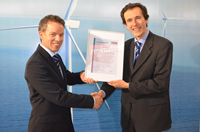
Coastal Gujarat Power Limited (CGPL), a fully owned company of Tata Power, having 4,000 MW (5x 800MW) Ultra Mega Power Plant (UMPP) in Mundra, Kutch, has come out with an elaborated action plan in response to concerns raised over impact on environment and livelihood of local fishing community there by the Ombudsman for International Finance Corporation (IFC).
This was revealed in a recent statement from IFC's executive vice president and CEO, Jin-Yong Cai, in response to Compliance Advisor Ombudsman (CAO) for the IFC's audit report on Tata Power's Mundra UMPP. The statement also included action plan chalked out by CGPL in relation to audit observations by the CAO.
Last month CAO for the IFC and the Multilateral Investment Guarantee Agency (MIGA) of the World Bank Group, had held that there were serious lapses by IFC in supervision of Tata Power's UMPP in Mundra, Kutch, impacting environment and livelihood of local fishing community there. It further held that IFC's review of project's environment and social assessments was not commensurate with project risk as required by its Sustainability Policy. However, IFC has refuted the charges levied by CAO and justified its actions and funding to the 4,000 MW (5x 800MW) power plant of CGPL.
"IFC’s management has taken on board many of the suggestions made in the report. Coastal Gujarat Power Limited (CGPL), the project's sponsor, is committed to IFC’s Performance Standards and, as evidenced in the attached action plan, is taking steps to respond to and address the concerns of affected communities, including the migrant fishing communities," read Cai's statement posted on CAO's website.
"IFC will work closely with CGPL, drawing upon experts, to review the studies referenced in the action plan and develop mitigation, compensation and/or offset options to be implemented. IFC will closely monitor CGPL's progress and adherence to the IFC Performance Standards, as it does with all clients, and refine our approach as necessary," the statement added.
The action plan chalked out by CGPL includes socio-economic survey of 21 villages, model confirmation studies by National Institute of Oceanography (NIO), Goa, turtle monitoring by Bombay Natural History Society (BNHS), biodiversity assessment study, inspection program to assess the coal and ash dust deposition in neighboring communities, undertaking health status and needs survey in the neighboring communities, undertaking testing for pollution levels, validate selected ambient air quality monitoring parameters that have changed significantly from the baseline and undertaking the environment and social impact assessment for the expansion project.
According to the Cai's statement, the CGPL has begun collecting fish catch data local from authorities for various studies and has been carrying out ambient air quality monitoring at seven locations in villages around the plant and will also establish an air quality monitoring station in the fish drying areas used by the seasonally resident fishing communities.
In August last year CAO had initiated audit of IFC's investment in the CGPL UMPP based on complaint by Machimar Adhikar Sangharsh Sangathan (MASS – Association for the Struggle for Fishworkers‘ Rights), an association of local fishing community raising concerns over the adverse social and environmental impact on them.
After audit the CAO found that evidence validate complaint by MASS which had raised a number of concerns about the UMPP's environmental and social impact on the local community of migratory fisher folk. It further found that "weaknesses in IFC’s environment and social (E&S) review of CGPL did not support the formation of a robust view as to whether the project could be expected to meet the requirements of the Performance Standards over a reasonable period of time, the threshold question in terms of IFC’s decision to invest."
Reacting to the IFC CEO's recent statement MASS general secretary Bharat Patel said in a statement, "We reject this statement and action plan. The 1.5 page statement and action plan on Tata Mundra issued by IFC CEO Jin-Yong Cai is a non-serious, non-committal one, and issued under duress from the growing criticism of IFC’s / World Bank President Kim’s inaction on CAO’s findings of serious social and environmental violations. It’s empty and a non-starter. By issuing this, IFC is trying to confuse the public, making a mockery of communities’ concerns and yet again, undermine CAO and its findings."
IFC has invested $450 million of its own capital in this project, which it has classified as a category A project, signifying that it believes there are potentially significant adverse social and environmental impacts that may be diverse or irreversible. The IFC was also considering investing up to $50 million in equity as part of its exposure to the project and syndicating up to about $300 million in loans.







 India’s infrastructure sector may be burdened by high debt and slowing growth, but this isn’t dampening its attraction for foreign investors. This is because not only are valuations attractive, new opportunities have also arisen in sectors such as renewable energy.
India’s infrastructure sector may be burdened by high debt and slowing growth, but this isn’t dampening its attraction for foreign investors. This is because not only are valuations attractive, new opportunities have also arisen in sectors such as renewable energy.


